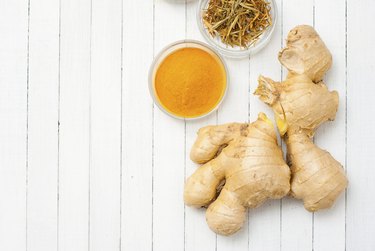
Derived from the Curcuma longa plant's root, turmeric is commercially available as fresh root nodes, a spice powder for use in cooking, or in the form of turmeric capsules for medical use. Turmeric's active compound, curcumin, is responsible for the spice's many health benefits.
Although this golden colored spice has been used for centuries by Asian communities to treat inflammation and combat infections, it is only just starting to gain recognition in the West. While turmeric's benefits include treating skin rashes and preventing skin cancer, more studies need to be conducted on a larger scale to establish the effectiveness of daily turmeric capsule consumption in individuals.
Video of the Day
Video of the Day
Turmeric Dosage Amounts
According to the USC Leonard Davis School of Gerontology, adults can safely consume approximately 12 grams of curcumin without any adverse side effects. A tablespoon of turmeric offers only 0.136 grams of curcumin, so to reach the maximum turmeric dosage, you would need to eat 88 tablespoons. The Oregon State Linus Pauling Institute's Micronutrient Information Center explains that a turmeric dosage with curcumin consumption under 3.6 grams per day will not be detected in the bloodstream.
Read More: Does Golden Milk Live Up to the Health Hype?
It's also important to note that turmeric has a low bioavailability, which means that it is often poorly absorbed. Eating turmeric with foods that are high in fat, like nuts and avocados, will also help your turmeric dosage be better absorbed by your body.
Alternatively, consuming black pepper with turmeric capsules can also help. According to the UMass Medical School Center for Applied Nutrition, it is the compound piperine, in black pepper, that is responsible for increasing the bioavailability of turmeric. It works by inhibiting the liver's mechanism for the excretion of water-soluble substances.
Turmeric and Stomach Pain
When it comes to turmeric and stomach pain, too much turmeric can sometimes be a bad thing. The authors of an October 2017 study published in Foods report that in a small study with seven people, high doses of curcumin resulted in headaches and rashes. Some even experienced nausea and diarrhea, coupled with yellow stool.
Read More: Turmeric and Weight Loss
People with gallbladder disease should also take care to be mindful of their turmeric intake. According to the Memorial Sloan Kettering Cancer Center, turmeric can have a negative effect on people with gastrointestinal issues, and especially those predisposed to kidney stones.
Those who have incorporated a repeated, long-term turmeric dosage into their diets may not necessarily experience the purported turmeric benefits. In fact, the opposite can happen, and you can end up with stomach issues, explains the National Center for Complementary and Integrative Health. Consulting your primary physician is always advisable before starting turmeric capsules.
Other Turmeric Side Effects
An excess of turmeric and rash development may go hand-in-hand. According to a March 2014 study published in Contact Dermatitis, researchers found that one example of turmeric's side effects on the skin of sensitive people is contact dermatitis.
Contact dermatitis is often caused when the skin comes into direct contact with the substance causing the allergic reaction — in the case of this study, it was from contact with turmeric powder or a curcumin coloring agent. However, fewer than 10 cases of contact dermatitis from turmeric have been recorded which, isn't enough for a definitive proof of the phenomenon.
Similarly, curcumin may also elicit an allergic response in certain people resulting in the formation of hives, clinically known as urticaria. The Oregon State Linus Pauling Institute's Micronutrient Information Center states that curcumin, the compound present in turmeric, has the ability to prevent the coagulation of blood. This can be particularly dangerous for people on anticoagulants, or on blood thinners like aspirin, as turmeric may increase the risk of bleeding.
- USC Leonard Davis School of Gerontology: “Turmeric: A Trend With Benefits?”
- PennState Extension: “Golden and Delicious Turmeric”
- Memorial Sloan Kettering Cancer Center: “Turmeric"
- Oregon State Linus Pauling Institute's Micronutrient Information Center: “Curcumin"
- Foods: "Curcumin: A Review of Its’ Effects on Human Health”
- National Center for Complementary and Integrative Health: "Turmeric"
- UMass Medical School Center for Applied Nutrition: "Using Black Pepper to Enhance the Anti-Inflammatory Effects of Turmeric"
- Contact Dermatitis: "Contact Dermatitis as an Adverse Reaction to Some Topically Used European Herbal Medicinal Products - Part 1: Achillea Millefolium-Curcuma Longa"